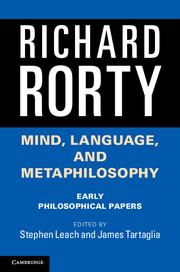Book contents
- Frontmatter
- Contents
- Foreword
- Acknowledgments
- Introduction
- 1 Pragmatism, categories, and language
- 2 The limits of reductionism
- 3 Realism, categories, and the “linguistic turn”
- 4 The subjectivist principle and the linguistic turn
- 5 Empiricism, extensionalism, and reductionism
- 6 Mind-body identity, privacy, and categories
- 7 Do analysts and metaphysicians disagree?
- 8 Incorrigibility as the mark of the mental
- 9 Wittgenstein, privileged access, and incommunicability
- 10 In defense of eliminative materialism
- 11 Cartesian epistemology and changes in ontology
- 12 Strawson’s objectivity argument
- 13 Verificationism and transcendental arguments
- 14 Indeterminacy of translation and of truth
- 15 Dennett on awareness
- 16 Functionalism, machines, and incorrigibility
- Index of names
- References
1 - Pragmatism, categories, and language
Published online by Cambridge University Press: 05 June 2014
- Frontmatter
- Contents
- Foreword
- Acknowledgments
- Introduction
- 1 Pragmatism, categories, and language
- 2 The limits of reductionism
- 3 Realism, categories, and the “linguistic turn”
- 4 The subjectivist principle and the linguistic turn
- 5 Empiricism, extensionalism, and reductionism
- 6 Mind-body identity, privacy, and categories
- 7 Do analysts and metaphysicians disagree?
- 8 Incorrigibility as the mark of the mental
- 9 Wittgenstein, privileged access, and incommunicability
- 10 In defense of eliminative materialism
- 11 Cartesian epistemology and changes in ontology
- 12 Strawson’s objectivity argument
- 13 Verificationism and transcendental arguments
- 14 Indeterminacy of translation and of truth
- 15 Dennett on awareness
- 16 Functionalism, machines, and incorrigibility
- Index of names
- References
Summary
Pragmatism is getting respectable again. Some philosophers are still content to think of it as a sort of muddle-headed first approximation to logical positivism – which they think of in turn as a prelude to our own enlightened epoch. But those who have taken a closer look have realized that the movement of thought involved here is more like a pendulum than like an arrow. This renewed interest in pragmatism has led to a new interest in Peirce, who somehow seems the most “up-to-date” of the pragmatists, and whose work in logic permits one to call him muddle-headed only if one is also willing to call him schizophrenic. But students of Peirce, even the most sympathetic, have had trouble digesting what he called his “Scotistic realism” and his categories of Firstness, Secondness, and Thirdness. These are obviously central features of his thought, yet they do not seem to sit well with his pragmatism. Still, Peirce insists over and over again that “the validity of the pragmatic maxim” and “Scotistic realism” mutually entail each other, and he suggests that they are both expressions of “the irreducibility of Thirdness.”
My purpose in this chapter is to try to show that the point Peirce is making in this identification is sound and important. Focusing on this point shows how far Peirce was in advance of the positivism of his day and how close his views are to the present trends in philosophy which have arisen in reaction to the more sophisticated positivism of Wittgenstein’s Tractatus and of the Vienna Circle. I want to suggest that Peirce’s thought envisaged, and repudiated in advance, the stages in the development of empiricism which logical positivism represented, and that it came to rest in a group of insights and a philosophical mood much like those we find in the Philosophical Investigations and in the writings of philosophers influenced by the later Wittgenstein.
Information
- Type
- Chapter
- Information
- Mind, Language, and MetaphilosophyEarly Philosophical Papers, pp. 16 - 38Publisher: Cambridge University PressPrint publication year: 2014
References
Accessibility standard: Unknown
Why this information is here
This section outlines the accessibility features of this content - including support for screen readers, full keyboard navigation and high-contrast display options. This may not be relevant for you.Accessibility Information
- 6
- Cited by
